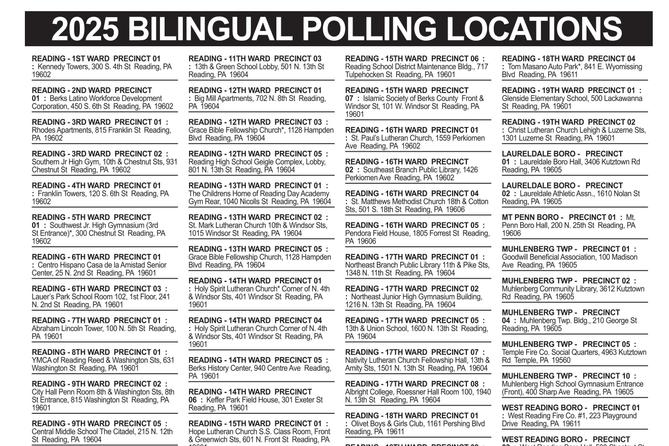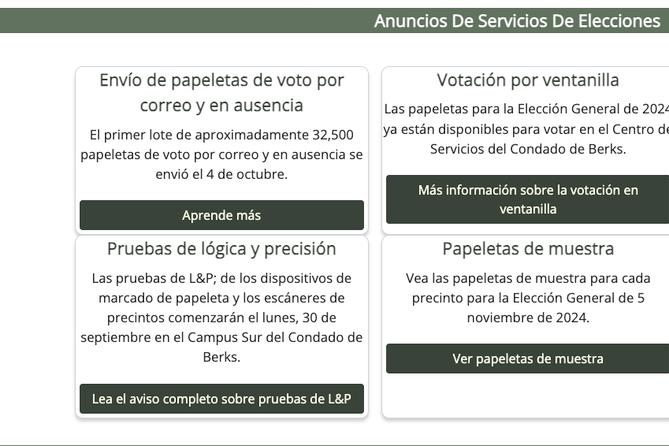READING — A Pennsylvania county where more than 60,000 people speak Spanish at home failed to update the translated version of its official election website until contacted by Spotlight PA in October.
The Spanish-language page on the county’s election services site had voting information and dates from the 2024 general election, as shown by an archived version of the page. The English version has been updated and had correct dates throughout the year.
One legal expert told the news outlet that failing to update the Spanish-language voting information on an official county website, just weeks before an election, likely violated Section 203, a provision of the federal Voting Rights Act that requires jurisdictions with significant numbers of people with limited English proficiency to provide language assistance.
“It's likely a violation, but worse than that, it could cause voter confusion, and they may not be able to vote because they were misled by the wrong date, and it may not occur to them, or they may not notice the 2024,” said Marian K. Schneider, a senior staff attorney at the Advancement Project who helped develop the state’s guidance on language access.
Schneider said Section 203 jurisdictions, such as Berks County, should have “a pretty robust checklist” of what their compliance looks like, and all the content provided on the English section of the website should also be available on the Spanish side.
Officials corrected the issue this week after Spotlight PA brought it to their attention, and say the county is otherwise ready to serve Spanish speakers on Nov. 4.
Berks is one of three counties in Pennsylvania mandated by federal law to provide language assistance, communications, and all election materials in both English and Spanish. Those counties qualify because more than 5% of their total voting-age populations have limited English skills.
Some of the materials that have to be provided in Spanish include voter registration forms, all ballots (including mail, sample, and provisional), signage, as well as information posted on the county’s election services website and social media accounts managed by the county.
It has struggled in the past to provide adequate services as required by the law. In 2021, Spanish-language instructions sent with mail ballots featured the wrong return deadline. The year before that, some poll workers weren’t able to “efficiently locate Spanish last names in the polling place registry,” WITF reported at the time, leading to long waits.
Norton said that since the problems in 2021, the Berks Office of Election Services goes “through a more rigorous proofreading process than was being done in the past” and makes sure at least two people review materials before sending them out.
Fifty-four Berks precincts will have interpreters on site to assist Spanish-speaking voters. Most of the county’s bilingual precincts — 44 — are located in the city of Reading. The remaining 10 are in Laureldale, Mt. Penn, and West Reading boroughs, and Muhlenberg Township.
These precincts are required by federal law to have at least one interpreter on site.

There will also be 12 standby interpreters at the county election services office available to answer calls from Spanish-speaking voters on Election Day. Elections director Anne Norton said those interpreters are trained to assist at polling places if needed.
“If that would happen, and we got a call from a poll worker or judge of election who said, ‘Hey, we have a lot of Spanish-speaking voters here right now. We need help,’ we can send one of those interpreters,” Norton said.
Federal law also allows voters to bring an interpreter of their choice to assist on Election Day, as long as the person is not the voter’s employer, a union representative, or a judge of elections.
Local organizations that assist immigrant communities will also be available at city precincts that serve a lot of Spanish-speaking voters and have had a history of needing more interpreters.
More than 18 volunteers and staff members from Make the Road Pennsylvania will be on hand to assist Spanish-speaking voters in understanding their rights, the ballot, and the voting process, Field Coordinator Nancy Jimenez-Zapata told Spotlight PA.
“We don't want people to get frustrated and leave right in the middle of planning to vote, because they don't have anyone who can communicate with them the way they would feel comfortable,” Jimenez-Zapata said.
